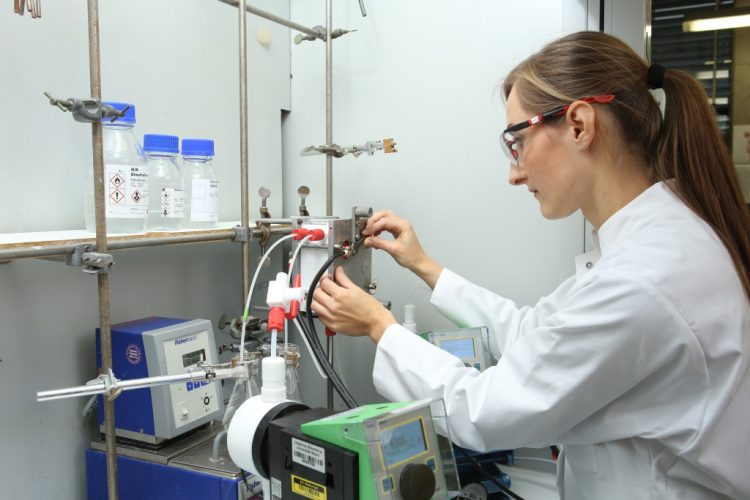Electro-organic synthesis that allows sustainable and green production of fine chemicals developed

A researcher setting up a flow electrolysis experiment photo/©: Alexander Sell, JGU
In the cooperative EPSYLON research project funded by the German Federal Ministry of Education and Research, scientists from Johannes Gutenberg University Mainz (JGU) and Evonik Performance Materials GmbH have succeeded in developing a state-of-the-art and innovative electro-organic synthesis.
The results of their research, presented in last week's issue of Science Advances, allow the use of electrosynthesis as a trend-setting and sustainable green chemistry for technical applications. The method developed allows the operator to react flexibly to the available supply of electricity. Moreover, the operator no longer has to rely on customized electrolysis apparatuses and can use a wide variety of different equipment.
The method of carrying out chemical reactions using electricity was developed more than 160 years ago by German chemist Hermann Kolbe. Although electrochemical syntheses are used in the chemical industry, this has so far been a niche technology. One reason is that the electrolysis conditions must be very finely controlled and uniform current input is essential.
Due to the sophisticated technical infrastructure, the option of electrosynthesis remained unknown to most chemists. Now, in the 21st century, the green potential of electrochemistry has been rediscovered. It makes sustainable and eco-friendly chemistry possible with very simple means, particularly with the use of surplus power from renewable sources, such as wind or solar energy.
Electrochemistry is a versatile and powerful method that can be used to produce various chemical compounds or to effect chemical changes in molecules. To put it simply, electrons replace costly and toxic reagents. Unnecessary wastes can be avoided and the reaction can be halted at any time by simply switching off the power.
Another advantage over classical synthesis is that many individual steps are more easily implemented by electrochemistry. In some cases, this can shorten a synthesis by several steps. However, electrolyses often require a narrow current-density window and long reaction times. In addition, selectivity and scalability are more difficult or even impossible.
The key to the success of the research group headed by Professor Siegfried Waldvogel of the Institute of Organic Chemistry at Johannes Gutenberg University Mainz is the use of a unique electrolyte system. The electrolyses here have extremely high stability to variation in current density, allowing operation in a current-density window with a width extending over more than two orders of magnitude, with no loss of productivity or selectivity. If the supply of current permits, the electrolysis may be carried out in a short time with very high current density.
Publication:
A. Wiebe, B. Riehl, S. Lips, R. Franke, S. R. Waldvogel.
Unexpected high robustness of electrochemical cross-coupling for a broad range of current density, Science Advances 2017, 3, eaao3920.
Images:
http://www.uni-mainz.de/presse/aktuell/bilder/09_orgchemie_flusselektrolyse.jpg
A researcher setting up a flow electrolysis experiment
photo/©: Alexander Sell, JGU
http://www.uni-mainz.de/presse/aktuell/bilder/09_orgchemie_screening-elektrolyse…
Up to eight different experiments can be simultaneously performed in this screening electrolyzer. Each small plastic cup houses two electrodes.
photo/©: Carsten Siering, JGU
Contact:
Professor Dr. Siegfried Waldvogel
Institute of Organic Chemistry
Johannes Gutenberg University Mainz
55099 Mainz, GERMANY
phone +49 6131 39-26069
fax +49 6131 39-26777
e-mail: waldvogel@uni-mainz.de
http://www.chemie.uni-mainz.de/OC/AK-Waldvogel/
Media Contact
All latest news from the category: Power and Electrical Engineering
This topic covers issues related to energy generation, conversion, transportation and consumption and how the industry is addressing the challenge of energy efficiency in general.
innovations-report provides in-depth and informative reports and articles on subjects ranging from wind energy, fuel cell technology, solar energy, geothermal energy, petroleum, gas, nuclear engineering, alternative energy and energy efficiency to fusion, hydrogen and superconductor technologies.
Newest articles

Bringing bio-inspired robots to life
Nebraska researcher Eric Markvicka gets NSF CAREER Award to pursue manufacture of novel materials for soft robotics and stretchable electronics. Engineers are increasingly eager to develop robots that mimic the…

Bella moths use poison to attract mates
Scientists are closer to finding out how. Pyrrolizidine alkaloids are as bitter and toxic as they are hard to pronounce. They’re produced by several different types of plants and are…

AI tool creates ‘synthetic’ images of cells
…for enhanced microscopy analysis. Observing individual cells through microscopes can reveal a range of important cell biological phenomena that frequently play a role in human diseases, but the process of…





















